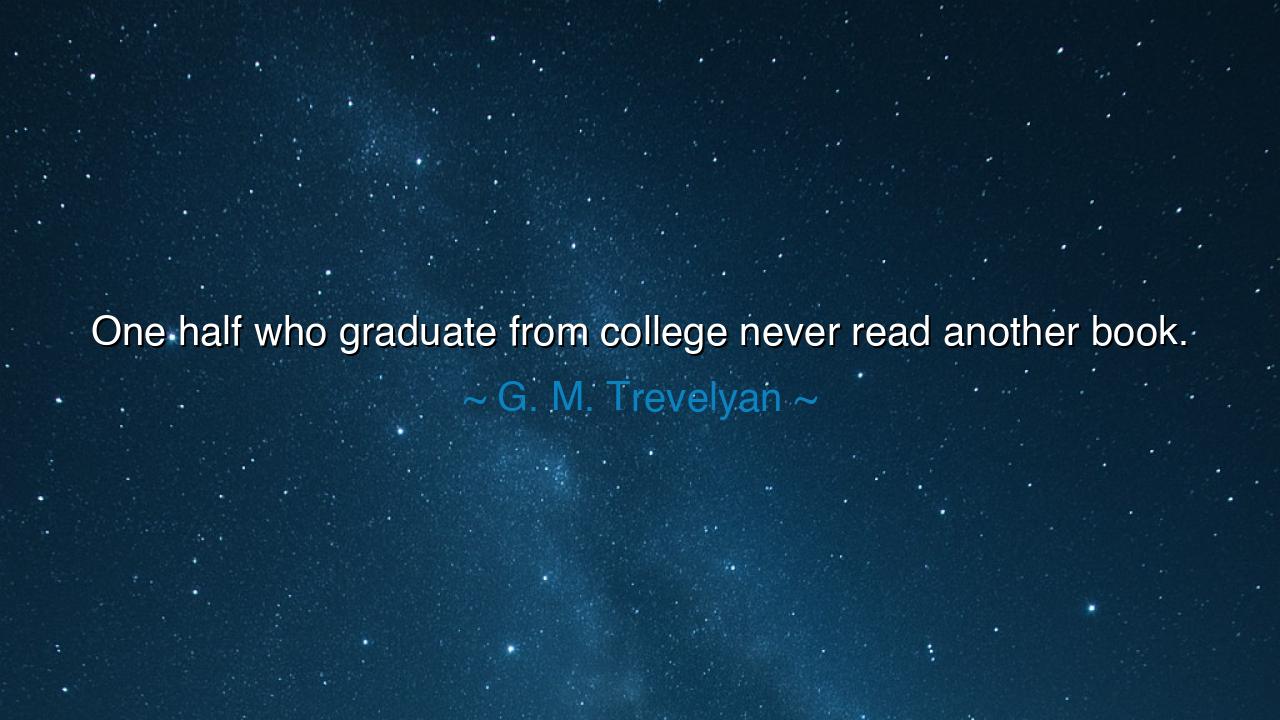
One half who graduate from college never read another book.






Hearken, children of thought, and receive the words of G. M. Trevelyan, who warned with somber clarity: "One half who graduate from college never read another book." In this stark observation lies a caution that echoes across the ages—a reminder that education, if abandoned at its threshold, is but a fleeting shadow, and that the acquisition of knowledge is not a destination marked by parchment, but a lifelong journey through the realms of thought and understanding.
Trevelyan’s insight emerges from a keen observation of human habit and intellect. Many a scholar, having crossed the ceremonial stage of graduation, rests beneath laurels of recognition, yet allows the curiosity of the mind to slumber. The degree, once a symbol of pursuit and discipline, becomes instead a threshold that is crossed only to close the doors behind it. True learning, however, demands continuity, engagement, and hunger for knowledge beyond structured instruction.
The origin of this reflection is rooted in centuries of human experience. The great libraries of Alexandria and the monasteries of Europe were built not merely to collect texts, but to nurture minds that would continue to wrestle with ideas long after the initial instruction. To cease reading is to halt the river of thought, to stagnate where vitality could flow. Trevelyan’s lament reminds us that graduation alone does not confer wisdom, but merely opens the gate to it.
Consider the story of Abraham Lincoln, who, largely self-taught, read relentlessly beyond the confines of formal schooling. He devoured texts of law, history, and rhetoric, forging his mind and character in the fires of inquiry. Contrast this with those who, having received formal degrees, never ventured beyond the textbooks assigned to them. Trevelyan’s warning resonates in this comparison: formal education is only the spark; it is continuous engagement that sustains the flame.
The consequences of intellectual stagnation are profound. The world is vast, and understanding is neither fixed nor finite. Those who cease to read, to question, to reflect, risk becoming spectators rather than participants in the unfolding of human culture and thought. The college degree, though celebrated, is powerless without the companion of continued inquiry. To neglect this is to clothe oneself in the illusion of wisdom while remaining blind to its depths.
Yet, there is hope in Trevelyan’s warning—a call to embrace lifelong learning as a sacred responsibility. One must cultivate habits of reading, reflection, and discussion, for these are the instruments by which the mind sharpens and the soul deepens. History is replete with those who understood this principle: Cicero, Montaigne, and Jefferson—all scholars who treated learning as a relentless pursuit, who read beyond the classroom to wrestle with the ideas that shaped human destiny.
The lesson is eternal: graduation is not the culmination of learning, but the commencement of responsibility to continue seeking knowledge. Let the sheepskin not be a veil over ignorance, but a reminder that the mind must remain ever vigilant, ever curious, and ever engaged. The true scholar does not cease at the final lecture, but carries the habit of inquiry into every day, every action, and every choice.
Practical actions arise from this truth: cultivate a daily practice of reading beyond necessity; seek works that challenge, provoke, and expand your understanding; engage in dialogue with those whose minds differ from your own; and remember that education is a lifelong voyage, not a brief ceremony. Let Trevelyan’s caution inspire you to read, reflect, and grow continually, ensuring that the flame kindled in youth burns brightly until your last day.






AAdministratorAdministrator
Welcome, honored guests. Please leave a comment, we will respond soon